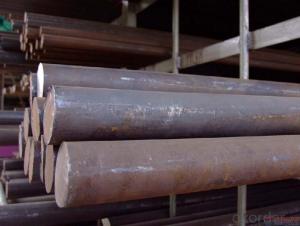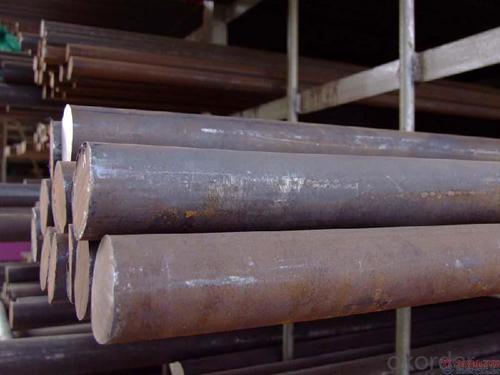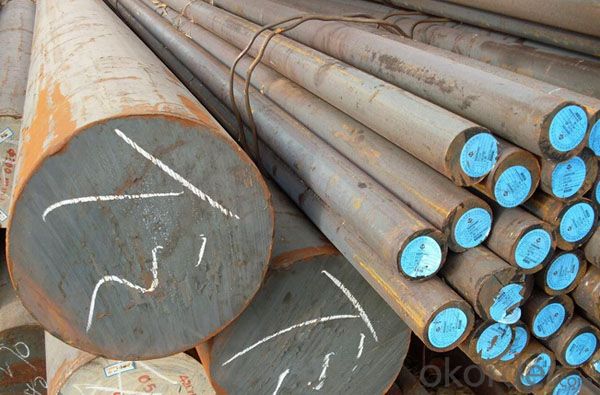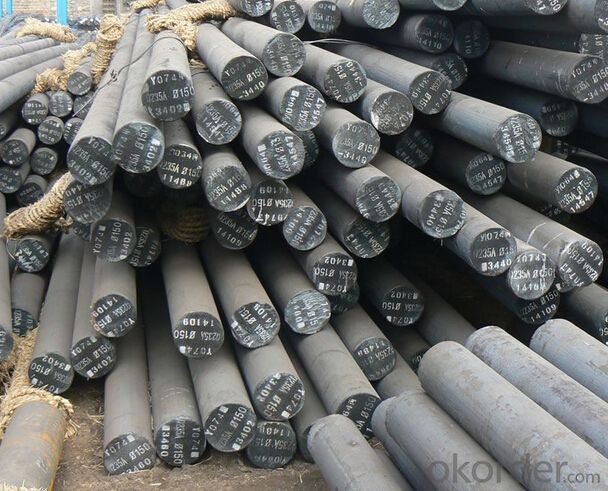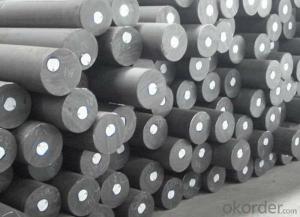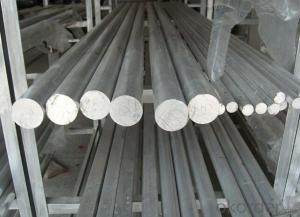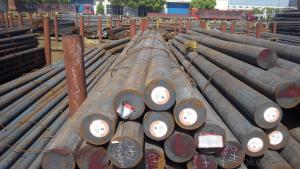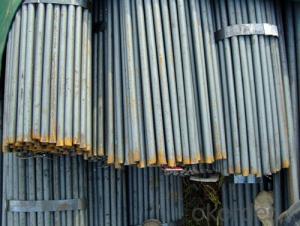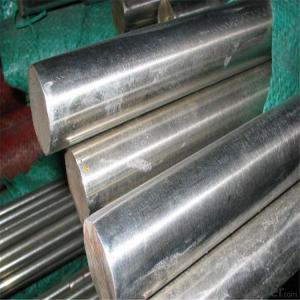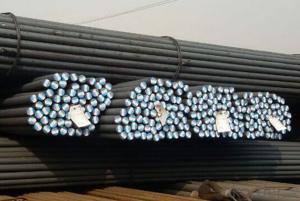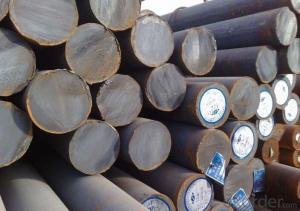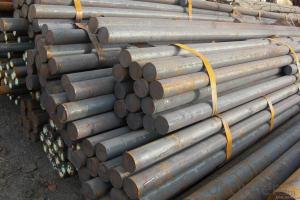Hot Rolled/Forged 45 SAE1045 AISI1045 CK45
- Loading Port:
- China main port
- Payment Terms:
- TT OR LC
- Min Order Qty:
- 30 m.t.
- Supply Capability:
- 10000 m.t./month
OKorder Service Pledge
OKorder Financial Service
You Might Also Like
Specification
Hot Rolled/Forged 45 SAE1045 AISI1045 CK45
Product Information:
Stock available in annealed and QT condition.
No MOQ for order.
Delivery 7-10 days.
Good tolerance according the the OD.
Staightness could meet 1mm/M per requirement.
Chemical Composition(%)
| Standard | C | Si | Mn | Cr | Ni | P/S ≤ |
| DIN | ≤0.15 | ≤1.0 | ≤2.0 | 18 | 9 | 0.03 |
| GB | ≤0.15 | ≤1.0 | ≤2.0 | 18 | 9 | 0.03 |
Applications of steel bar
Hardware, chemistry, foodstuff, medicine apparatus, making industry, computer or notebook components, etc.
Characteristic of steel bar
High carbon and high chromium, dimensionally stable, ledeburitic 12 % Cr alloyed cold work tool steel, non-deforming, better hardenability, higher cutting capacity and improved wear resistance than 1.2080, low distorsion, good edge holding properties, deep hardening, high compressive strength, high surface hardness after hardening, suitable for air hardening.
Heat Treatment of steel bar
Hardening:84°C
Hardness after tempering (HRC):56
Delivery condition: below HB250
Product Overviews:
| Product Name | Typical Grades | Diameter(mm) | Standard adopted |
| Carbon Steel | 20 (1020/S20C/C22) | Ø16-Ø300 | GB/SAE/JIS/DIN |
| 40 (1040/S40C/C40) | |||
| 45 (1045/S45C/C45) | |||
| Bearing Steel | GCr9 (51100/SUJ1) | Ø12-Ø250 | |
| GCr15 (52100/SUJ2/100Gr6) | |||
| GCr9SiMn (A485-Gr.1/SUJ3) | |||
| Cr-Mo Steel | 20Cr (5120/SCr420H/20Cr4) | Ø12-Ø250 | |
| 40Cr (5140/SCr440/41Cr4) | |||
| 42CrMo(4140/SCM440/42CrMo4) | |||
| Gear Steel | 20CrNiMo | Ø16-Ø600 | |
| 20CrMn(5115/SMnC420/20MnCr5) | |||
| 20CrNiMo(8620/SNCM220/20CrMiMo2) |
Product Show:

Our Advantages:
· Industry experience over 20 years.
· Shipment of goods -More than 70 countries worldwide.
· The most convenient transport and prompt delivery.
· Competitive price with best service.
· High technical production line with top quality products.
· High reputation based on best quality products.
With our experienced, enthusiastic and dynamic staffs, we assure to bring you the products with best quality, reasonable prices and good after-sales services under the motto: Friends First, Business After.
Communication, Experience, Expertise and Best efforts are our Promises to you.
- Q: What are the properties of tungsten alloys?
- Tungsten alloys have several notable properties. They possess a high melting point, excellent corrosion resistance, and superior strength. These alloys also exhibit remarkable density, making them ideal for use in various applications such as aerospace, defense, and medical industries. Additionally, tungsten alloys have good electrical and thermal conductivity, making them suitable for electrical contacts and heat sinks. Overall, their unique combination of properties makes tungsten alloys highly desirable for high-performance applications.
- Q: What is the role of carbon in special steel?
- Special steel relies on carbon to significantly impact its properties and performance. This type of steel is specifically engineered to showcase exceptional characteristics like high strength, hardness, wear resistance, and corrosion resistance. Carbon is a key alloying element in special steel, and its content dictates many of these desired properties. To begin, carbon is responsible for enhancing the strength and hardness of special steel. When carbon is introduced into the iron matrix, it forms iron carbides, which are exceptionally hard and provide structural integrity to the steel. The higher the carbon content, the greater the steel's hardness and strength. Consequently, special steel is well-suited for applications that demand high toughness, durability, and resistance to deformation, such as the manufacturing of tools, dies, and industrial machinery components. Additionally, carbon contributes to the wear resistance of special steel. The presence of carbon enhances the steel's ability to withstand abrasion and endure extreme conditions. This is especially important in industries like mining, construction, and oil and gas, where components face intense wear and friction. Moreover, carbon plays a crucial role in determining the machinability and weldability of special steel. The carbon content influences how the steel responds to heat treatment, affecting its ease or difficulty of machining and welding. Striking the right balance of carbon content is essential to ensure that special steel can be easily worked on and fabricated into complex shapes without compromising its properties. Lastly, carbon influences the corrosion resistance of special steel. Although steel is generally susceptible to corrosion, the addition of specific amounts of carbon can enhance its resistance to rusting and other forms of corrosion. This is particularly important in applications where the steel is exposed to harsh environments, such as in the marine or chemical industries. In conclusion, carbon plays a vital role in special steel by enhancing its strength, hardness, wear resistance, machinability, weldability, and corrosion resistance. The precise amount of carbon added to the steel is carefully controlled to achieve the desired properties for specific applications. This versatility and sought-after nature make special steel a highly valued material across various industries.
- Q: What are the challenges in machining high-speed special steel?
- Machining high-speed special steel poses several challenges, primarily due to its hardness and heat resistance. The high hardness of the steel makes it difficult to cut and shape, requiring specialized tools and techniques. Additionally, the steel's heat resistance can cause excessive heat generation during the machining process, leading to tool wear and reduced cutting performance. To overcome these challenges, manufacturers need to use high-quality cutting tools, employ effective cooling methods, and carefully optimize machining parameters to ensure precise and efficient machining of high-speed special steel.
- Q: How does special steel perform in hydrogen embrittlement conditions?
- Special steel performs differently in hydrogen embrittlement conditions compared to other types of steel. Hydrogen embrittlement occurs when hydrogen atoms diffuse into the steel's lattice structure, causing it to become brittle and prone to cracking under stress. However, special steel is designed to have improved resistance to hydrogen embrittlement. It typically contains specific alloying elements that reduce the diffusion of hydrogen and enhance its resistance to embrittlement. Additionally, special steel often undergoes specialized heat treatments or surface coatings to further enhance its resistance to hydrogen embrittlement. Overall, special steel performs better in hydrogen embrittlement conditions compared to regular steel, making it a preferred choice for applications where exposure to hydrogen is a concern.
- Q: Can special steel be used in the recycling industry?
- Yes, special steel can be used in the recycling industry. Special steel, also known as alloy steel, has specific properties that make it suitable for various applications. In the recycling industry, special steel can be recycled and processed to create new products, reducing the need for raw materials and conserving resources. Its durability, corrosion resistance, and high strength make it valuable in the recycling process, where it can be melted down and transformed into new steel products.
- Q: How does special steel meet the requirements of specific industries?
- Special steel meets the requirements of specific industries by offering exceptional strength, durability, and resistance to corrosion, heat, and wear. Its unique composition and manufacturing process allow it to withstand extreme conditions and perform efficiently in diverse applications such as automotive, aerospace, energy, construction, and manufacturing. Additionally, special steel can be tailored to meet the specific needs of each industry, ensuring optimal performance and reliability in their respective operations.
- Q: How is special steel used in the packaging industry?
- Special steel is widely used in the packaging industry for its exceptional strength, durability, and corrosion resistance properties. It is commonly utilized to manufacture packaging materials such as cans, containers, and closures. Special steel ensures the safety and integrity of products during storage and transportation, while also allowing for efficient and cost-effective packaging solutions.
- Q: How does special steel perform in high-temperature strength?
- Special steel performs well in high-temperature strength due to its unique composition and properties. It is specifically designed to withstand and maintain its mechanical strength and structural integrity at elevated temperatures. This is achieved through the careful selection of alloying elements, heat treatment processes, and precise control of microstructure. Special steel exhibits excellent resistance to deformation, creep, and oxidation, making it a preferred choice for applications that involve high temperatures, such as in power generation, aerospace, and industrial processing.
- Q: How is high-strength steel used in the automotive industry?
- High-strength steel is extensively used in the automotive industry for various applications such as structural components, safety systems, and body panels. It provides enhanced strength and durability while reducing the weight of vehicles, thereby improving fuel efficiency and overall performance. Additionally, high-strength steel also ensures increased passenger safety by reinforcing the vehicle's structure and offering better crash protection.
- Q: How does special steel contribute to the manufacturing of springs for automotive applications?
- The unique properties and characteristics of special steel play a crucial role in the manufacturing of springs for automotive applications. Springs are essential components in automobiles as they provide suspension and shock absorption, which ensures a comfortable and smooth ride. One of the main advantages of using special steel in spring manufacturing is its high strength and durability. Springs are constantly subjected to stress and repetitive loading, but special steel can withstand these forces without deforming or breaking due to its exceptional strength. This property ensures that the springs can maintain their shape and performance over extended periods of use, guaranteeing reliable functionality. Special steel also offers excellent fatigue resistance, a vital characteristic for automotive springs. Fatigue occurs when a material weakens and eventually fails after repeated loading and unloading cycles. However, special steel is specifically designed to withstand fatigue, allowing the springs to endure constant pressure and stress without prematurely failing. Furthermore, special steel provides superior corrosion resistance, which is particularly important for automotive springs. Cars are exposed to various environmental elements, such as moisture, road salt, and chemicals, which can lead to corrosion and deterioration of the springs. By utilizing special steel with enhanced corrosion resistance, manufacturers can ensure that the springs have a longer lifespan and maintain their performance even in harsh conditions. Additionally, special steel offers versatility in terms of its composition and properties. Manufacturers can choose from a wide range of special steel alloys, each with its own unique characteristics, to meet specific requirements. This flexibility in material selection empowers manufacturers to design and produce springs that are tailored to the specific needs of automotive applications. Some alloys offer greater elasticity, allowing the springs to flex and absorb shocks more effectively, while others provide higher hardness, enhancing the springs' load-bearing capacity. In conclusion, special steel significantly contributes to the manufacturing of springs for automotive applications by providing high strength, durability, fatigue resistance, corrosion resistance, and versatility. These properties enable the production of reliable, long-lasting springs that ensure optimal suspension, shock absorption, and overall performance in vehicles.
Send your message to us
Hot Rolled/Forged 45 SAE1045 AISI1045 CK45
- Loading Port:
- China main port
- Payment Terms:
- TT OR LC
- Min Order Qty:
- 30 m.t.
- Supply Capability:
- 10000 m.t./month
OKorder Service Pledge
OKorder Financial Service
Similar products
Hot products
Hot Searches
Related keywords
